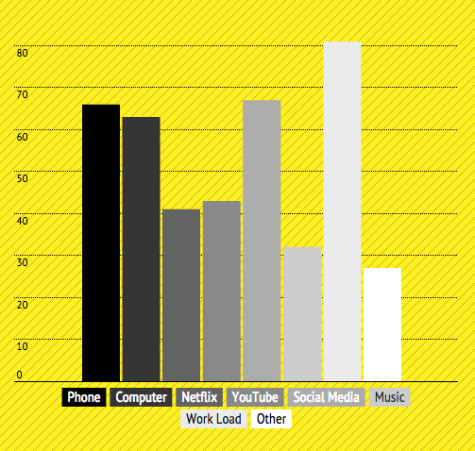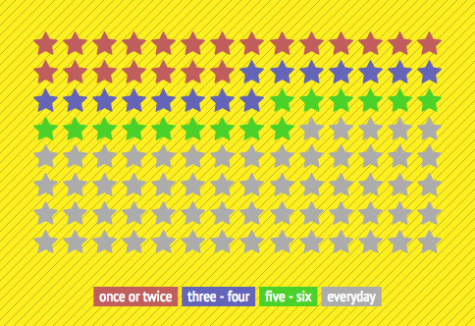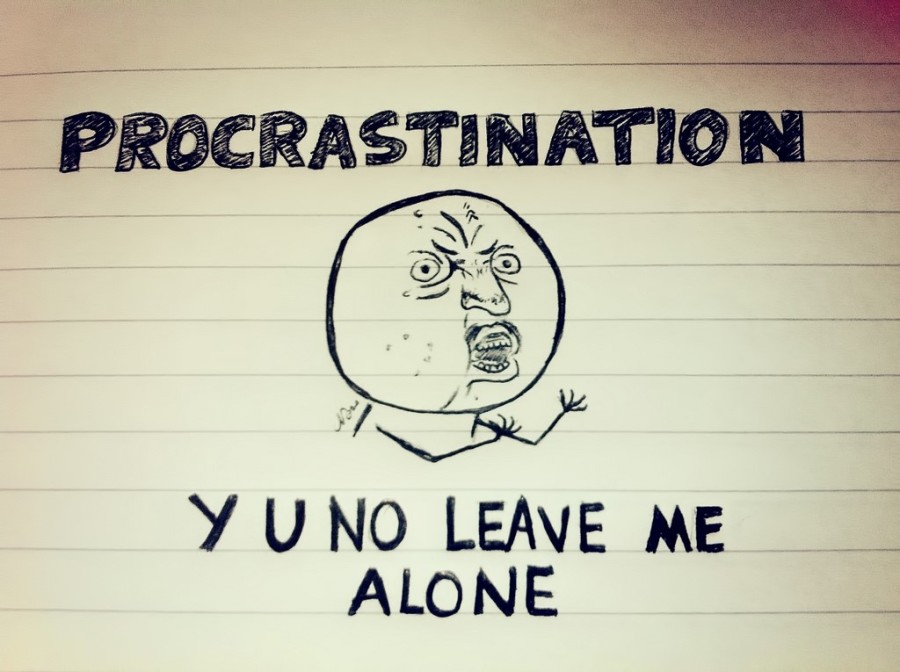No, Not Procrastination. It’s Called Strategized Laziness.
It’s Monday night and you have a paper due the next day. You’ve been putting it off for over a week now telling yourself, “I’ll start it tomorrow” or “I just don’t have enough information yet.” Either way you’re putting it off, better known as procrastinating.
Access to cell phones, computers, iPods, and many other devices gives students are able to find thousands of things to do instead of their homework. In a recent study conducted by The Willistonian 55 percent of the Williston Northampton School’s student body admitted to procrastinating every night, while 14 percent said they procrastinate five or six times a week. Also, 14 percent of students procrastinate three to four days of the week and 18.2 percent of students procrastinate once or twice per week. Of all the people surveyed nobody said they have never procrastinated their schoolwork.
In the same study students were asked what they believed caused them to procrastinate the most, and more than one option could be selected. Of all the options that were given, phone, computer, Netflix, YouTube, social media, music, and workload, as well as an0ther option, most students, 82 percent, chose workload or not knowing where to start as what caused them to put off starting homework. Following the workload was social media at 68 percent and their phones at 66 %. Music received the lowest votes, 32 percent.
In “Procrastination: Ten Things to Know,” an article in Psychology Today, Hara Estroff Marano states, “Twenty % of people identify themselves as chronic procrastinators. For them procrastination is a lifestyle, albeit a maladaptive one. And it cuts across all domains of their life. They don’t pay bills on time. They miss opportunities for buying tickets to concerts. They don’t cash gift certificates or checks. They file income tax returns late. They leave their Christmas shopping until Christmas Eve.”
Mr. Ben Thompson, Director of Psychological Counseling Services at the Williston Northampton School, comments, “There are many possible psychological reasons for procrastination, including a lack of interest, fear of failure, fear of success (believe it or not), lack of motivation, a need to rebel, and not having the skills to deal with what needs to be accomplished.”
As the procrastination problem has seemingly become more of a problem the past few years, more and more scientists have begun to look into potential scientific reasons behind procrastination.
Mr. Thompson notes some of the issues he has witnessed among students. “I definitely see students for whom procrastination is a problem. There are various reasons why it happens. Sometimes, students get involved in other more enjoyable activities, like playing video games, and keep putting off their academic work. Other times, students just dread a particular assignment and find all sorts of reasons to avoid digging into it. And there are always some students who procrastinate because they are afraid of failure,” he says.
While technology is often a reason behind procrastination it is not always the sole reason or even the main reason. More often than not it is the amount of work a student has that causes them to procrastinate the most. With the schedule all Williston students have and the workload that comes along with the five or six classes each student takes, not to mention AP classes, some students view the workload as being too much or too stressful and they are overwhelmed which leads to procrastination.
Mr. Thompson commented on Williston’s schedule and how it may have an affect on student’s motivation to start their work, “Our students certainly have packed schedules, with little free time. It can be exhausting and overwhelming at times. Sometimes students just need to plan their time more carefully.”
Another aspect of Williston’s schedule that could lead students to procrastinate is Study Hall. Serena

Chen ’16 says, “The fact that we have required Study Hall makes me feel like I should save my work for then, because I’m not allowed to do anything but study during Study Hall so I’d prefer to procrastinate than to be bored.”
Mr. Thompson says, “For some, this is certainly a problem. Kids who work slowly, have specific learning challenges, are more interested in their social lives/online activity, or are just plain lazy have a harder time in this area than do others.
With the busy schedule Williston students face and only two hours reserved out of the day for schoolwork students believe they must cut one thing out of their schedules or, more often than not, decide to stay up late to completely their daily homework assignments.
In his article “A Historical View of Procrastination” posted on Psychology Today’s website Bill Knaus, Ed. D, writes, “The study of history offers two competing outlooks on human nature. On the one hand, the past reveals continuity in our psychological makeup. People thousands of years ago were much like we are today. Human foibles [weaknesses], including the tendency to put off vitally important commitments, are universal. Ancient wisdom remains relevant for our confrontation with procrastination.”
Knaus also pointed to references of procrastination in many religious texts. He writes, “Punctuality is the essence of ethics. As Hillel, again, says in one of the most famous expressions in the entire Jewish tradition: ‘If I am not for myself, who will be for me? But if I am only for myself, who am I? And if not now, when?’”
He also quoted the Bible, writing, “Numerous admonitions in the Christian Bible also speak to humankind’s perennial tendency to put things off. Jesus taught that reconciling with our adversaries should be done—immediately (Matthew 5:23-24).”
He continues, “From these ancient sources we learn that procrastination is a spoiler of morality. It’s not enough to know what is right. Personal discipline must close the gap between a good intention and a good deed. This is no less true today than in ancient times.”
While the passages Knaus points to seemingly talk about larger problems than a student’s homework assignment, they still illustrate that procrastination has been an issue for longer than people may think.
In The Willistonian’s survey many students said they only procrastinated because they would be afraid of the final result, whether it was good or bad. In an academic environment this potential guilt, or distress, can cause students to perform at less than their best.

Created by: JJ Celentano
Mr. Thompson notes, “It’s a big problem for some students, and not much of a concern at all for others. There’s no reason to believe it’s any different here compared to any other school.“
Jennifer Baker, Ph. D., wrote about the morality of procrastination in her Psychology Today article “Procrastination and Moralit.” She notes, “Procrastination, these ethicists would think, is a sign that a person does not understand what is really of value yet. If you are up all night, worried sick once again about a presentation you have not sufficiently rehearsed, the Stoic or Epicurean voice in your head would be the one saying, ‘The presentation does not matter; the presentation is not worth this.’”
As procrastination continues to develop students, teachers and other people interested in resolving the issue are finding new ways to help students focus on their work. For example, at The Williston Northampton School students must turn in their phones during Study Hall. Of the twenty-six boarding students who were surveyed 53 % said their phone cause them to procrastinate, and while the number is higher for day students, 76. However, boarding students may be starting their work before or after study hall and this could be the reason their phones are causing them to procrastinate.
When asked the question, “How do you stop procrastination?,” many people often say its as easy as just putting away the distractions. However, with technology being a large factor in teen lives, and in many cases necessary for completing schoolwork, people are starting to turn to the psychological elements of procrastination to find a way to prevent students from procrastinating.
In his article “Ending Procrastination –Right Now!” Timothy Pychyl emphasizes, “When self-regulation fails, it’s often because short-term emotional repair takes precedence over our long-term goals. For example, a task at hand makes us feel anxious or overwhelmed, so we ‘give in to feel good,’ seeking immediate emotional relief, and we walk away, leaving the task for tomorrow.”
Pychyl also wrote, “A great deal of recent research clearly indicates that willpower is like a muscle. You can exhaust it more quickly than you might imagine and, when you do, you lose your ability to self-regulate your behavior… Another self-regulatory boost can come from mindfulness meditation. Attention is the first step in self-regulation, so learning to keep focused attention will help you procrastinate less by strengthening self-regulation.”
While students everywhere have put off their work countless times there always seem to be one fact that remains the same: technology has only made the procrastination problem worse. However, the key to unlocking the resolution to the never-ending problem could be within people’s psyche, but the real question is, will anyone ever find the reason behind procrastination or will they just continue watching Netflix or the latest YouTube sensation?








